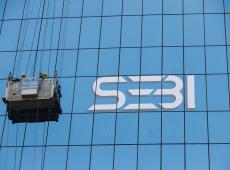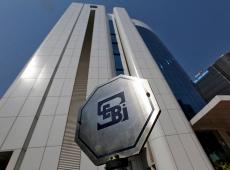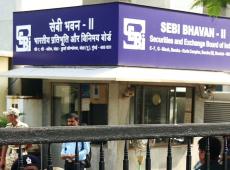Sebi Revises Eligibility Criteria for Derivatives Stocks
By Rediff Money Desk, New Delhi Aug 30, 2024 22:17
Sebi tightens rules for stocks entering derivatives segment, requiring higher market depth and trading activity. New criteria aims to prevent market manipulation and protect investors.

Illustration: Dominic Xavier/Rediff.com
New Delhi, Aug 30 (PTI) Capital markets regulator Sebi on Friday revised the eligibility criteria for entry and exit of stocks in the derivatives segment to ensure that only high-quality stocks with sufficient market are allowed to trade in such segment.
To be eligible for entry into the derivatives segment, stocks must meet certain criteria based on their performance in the cash market over the previous six months on a rolling basis.
The stock's Median Quarter Sigma Order Size (MQSOS) must be at least Rs 75 lakh, revised, from the current Rs 25 lakh and the Market Wide Position Limit (MWPL) must be at least Rs 1,500 crore, increased from the present Rs 500 crore due to a rise in market capitalisation, Sebi said in circular.
Additionally, the stock's Average Daily Delivery Value in the cash market has been increased to at least R 35 crore from Rs 10 crore, owing to a significant increase in the average daily delivery value.
Stocks, which meet the eligibility criteria in the underlying cash market of any stock exchange, would be permitted to trade in the equity derivatives segment of all stock exchanges.
The stock exchanges will settle the derivative contracts at a price calculated by the clearing corporations based on volume-weighted average price (VWAP) from the cash segment across all exchanges.
In addition, other aspects like any surveillance concerns, ongoing investigations, or other administrative considerations will be taken into account by Sebi, while considering a stock for introduction into the derivatives segment.
In case, a stock fails to meet these criteria for three months it will exit the derivatives segment. No new contract will be issued on these stocks.
However, the existing unexpired contracts can be allowed to trade till expiry. Once a stock is excluded from the derivatives segment, it will not be considered for re-inclusion for one year.
"Given the need to ensure that only high-quality stocks with sufficient market depth are allowed to trade in the derivatives segment and considering the growth witnessed in market parameters since the last review conducted in 2018, the eligibility criteria for entry/exit of stocks in derivatives segment has been revised," Sebi said.
Also, the regulator has introduced a product success framework (PSF) for single-stock derivatives.
Under this framework, at least 15 per cent of trading members active in all stock derivatives, or 200 trading members (whichever is lower), must have traded in any derivative contract on the stock being reviewed, on average, each month during the review period.
Additionally, trading must occur on at least 75 per cent of the trading days during the review period. The stock should also have an average daily turnover (futures and options premium combined) of at least Rs 75 crore and an average daily notional open interest (futures and options combined) of at least Rs 500 crore during the review period.
Sebi noted that derivative markets enhance price discovery and market liquidity.
However, without sufficient depth in the underlying cash market, sufficient volumes in derivatives markets, and appropriate position limits around leveraged derivatives, there can be higher risks of market manipulation, increased volatility, and compromised investor protection, it added.
To be eligible for entry into the derivatives segment, stocks must meet certain criteria based on their performance in the cash market over the previous six months on a rolling basis.
The stock's Median Quarter Sigma Order Size (MQSOS) must be at least Rs 75 lakh, revised, from the current Rs 25 lakh and the Market Wide Position Limit (MWPL) must be at least Rs 1,500 crore, increased from the present Rs 500 crore due to a rise in market capitalisation, Sebi said in circular.
Additionally, the stock's Average Daily Delivery Value in the cash market has been increased to at least R 35 crore from Rs 10 crore, owing to a significant increase in the average daily delivery value.
Stocks, which meet the eligibility criteria in the underlying cash market of any stock exchange, would be permitted to trade in the equity derivatives segment of all stock exchanges.
The stock exchanges will settle the derivative contracts at a price calculated by the clearing corporations based on volume-weighted average price (VWAP) from the cash segment across all exchanges.
In addition, other aspects like any surveillance concerns, ongoing investigations, or other administrative considerations will be taken into account by Sebi, while considering a stock for introduction into the derivatives segment.
In case, a stock fails to meet these criteria for three months it will exit the derivatives segment. No new contract will be issued on these stocks.
However, the existing unexpired contracts can be allowed to trade till expiry. Once a stock is excluded from the derivatives segment, it will not be considered for re-inclusion for one year.
"Given the need to ensure that only high-quality stocks with sufficient market depth are allowed to trade in the derivatives segment and considering the growth witnessed in market parameters since the last review conducted in 2018, the eligibility criteria for entry/exit of stocks in derivatives segment has been revised," Sebi said.
Also, the regulator has introduced a product success framework (PSF) for single-stock derivatives.
Under this framework, at least 15 per cent of trading members active in all stock derivatives, or 200 trading members (whichever is lower), must have traded in any derivative contract on the stock being reviewed, on average, each month during the review period.
Additionally, trading must occur on at least 75 per cent of the trading days during the review period. The stock should also have an average daily turnover (futures and options premium combined) of at least Rs 75 crore and an average daily notional open interest (futures and options combined) of at least Rs 500 crore during the review period.
Sebi noted that derivative markets enhance price discovery and market liquidity.
However, without sufficient depth in the underlying cash market, sufficient volumes in derivatives markets, and appropriate position limits around leveraged derivatives, there can be higher risks of market manipulation, increased volatility, and compromised investor protection, it added.
Source: PTI
Read More On:
DISCLAIMER - This article is from a syndicated feed. The original source is responsible for accuracy, views & content ownership. Views expressed may not reflect those of rediff.com India Limited.
You May Like To Read
TODAY'S MOST TRADED COMPANIES
- Company Name
- Price
- Volume
- Vodafone Idea L
- 15.63 ( -4.17)
- 51716103
- Srestha Finvest
- 1.94 ( -1.02)
- 39556969
- Inventure Growth & S
- 2.47 ( -19.81)
- 31916723
- Genpharmasec Ltd
- 3.51 ( -4.88)
- 21009955
- GTL Infrastructure
- 2.68 ( -0.37)
- 16825789
MORE NEWS
Electronics Exports Surge 23% Annually, India's...
India's electronics exports have grown to become the country's 5th largest commodity,...

Sebi Revises Eligibility Criteria for...
Sebi tightens rules for stocks entering derivatives segment, requiring higher market...

Wipro to Hire 12,000 Staff in FY25,...
Wipro plans to hire 12,000 staff in FY25, prioritizing onboarding freshers who were...












 © 2024 Rediff.com India Limited. All rights reserved.
© 2024 Rediff.com India Limited. All rights reserved.